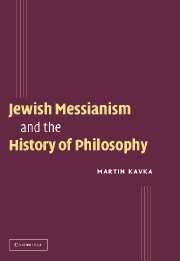Book contents
- Frontmatter
- Contents
- Acknowledgments
- List of Abbreviations
- Introduction: From Athens to Jerusalem
- 1 The Meontological Conundrum: Emmanuel Levinas and Emil Fackenheim on the Athens–Jerusalem Conflict
- 2 Beyond “Beyond Being”: Nonbeing in Plato and Husserl
- 3 Nonbeing as Not-Yet-Being: Meontology in Maimonides and Hermann Cohen
- 4 Nonbeing Ensouled, Nonbeing Embodied: Levinas versus Rosenzweig on the Role of the Other in Messianic Anticipation
- Conclusion: Deepening the Roots of the Jewish Meontological Tradition, or contra the Derridean “Messianic”
- Works Cited
- Index
4 - Nonbeing Ensouled, Nonbeing Embodied: Levinas versus Rosenzweig on the Role of the Other in Messianic Anticipation
Published online by Cambridge University Press: 09 July 2009
- Frontmatter
- Contents
- Acknowledgments
- List of Abbreviations
- Introduction: From Athens to Jerusalem
- 1 The Meontological Conundrum: Emmanuel Levinas and Emil Fackenheim on the Athens–Jerusalem Conflict
- 2 Beyond “Beyond Being”: Nonbeing in Plato and Husserl
- 3 Nonbeing as Not-Yet-Being: Meontology in Maimonides and Hermann Cohen
- 4 Nonbeing Ensouled, Nonbeing Embodied: Levinas versus Rosenzweig on the Role of the Other in Messianic Anticipation
- Conclusion: Deepening the Roots of the Jewish Meontological Tradition, or contra the Derridean “Messianic”
- Works Cited
- Index
Summary
It is by now a truism that the most dramatic development in American modern Jewish thought since the 1960s, and especially since the 1990s, has been the explosion of work on the writings of Franz Rosenzweig (1886–1929) – the interpretive secondary works, the new translations, the scores of conference papers. Rosenzweig is an ideal standard-bearer for the task of formulating a Jewish philosophy for the postmodern era: his language evokes the texts of the Talmud, Kabbalah, and Maimonides and is ahead of its time insofar as it anticipates the rise of phenomenology in Continental philosophy as well as the linguistic turn of recent French thought and American pragmatism. The multiple “Rosenzweigs” apparent in a reading of the Star of Redemption (first published in 1921) parallel the text's multiple Judaisms: the extensive evocation of the concrete life of Jewish ritual liturgy in the third book, as well as a demythologized view of revelation and religious ethics in the second book. The Star is a book for everyone.
Indeed, Rosenzweig may be even better suited than Levinas for the task of providing an organic Jewish philosophy. Levinas is definitely implicated in both the Jewish and postmodern worlds by virtue of his ethical critique of the totalizing humanist systems that reduce the particular to the general, and by virtue of his verifying this critique through a return to Jewish texts, both from the Talmud and from the ethico-Kabbalistic texts of the Lithuanian musar movement.
- Type
- Chapter
- Information
- Jewish Messianism and the History of Philosophy , pp. 129 - 192Publisher: Cambridge University PressPrint publication year: 2004

